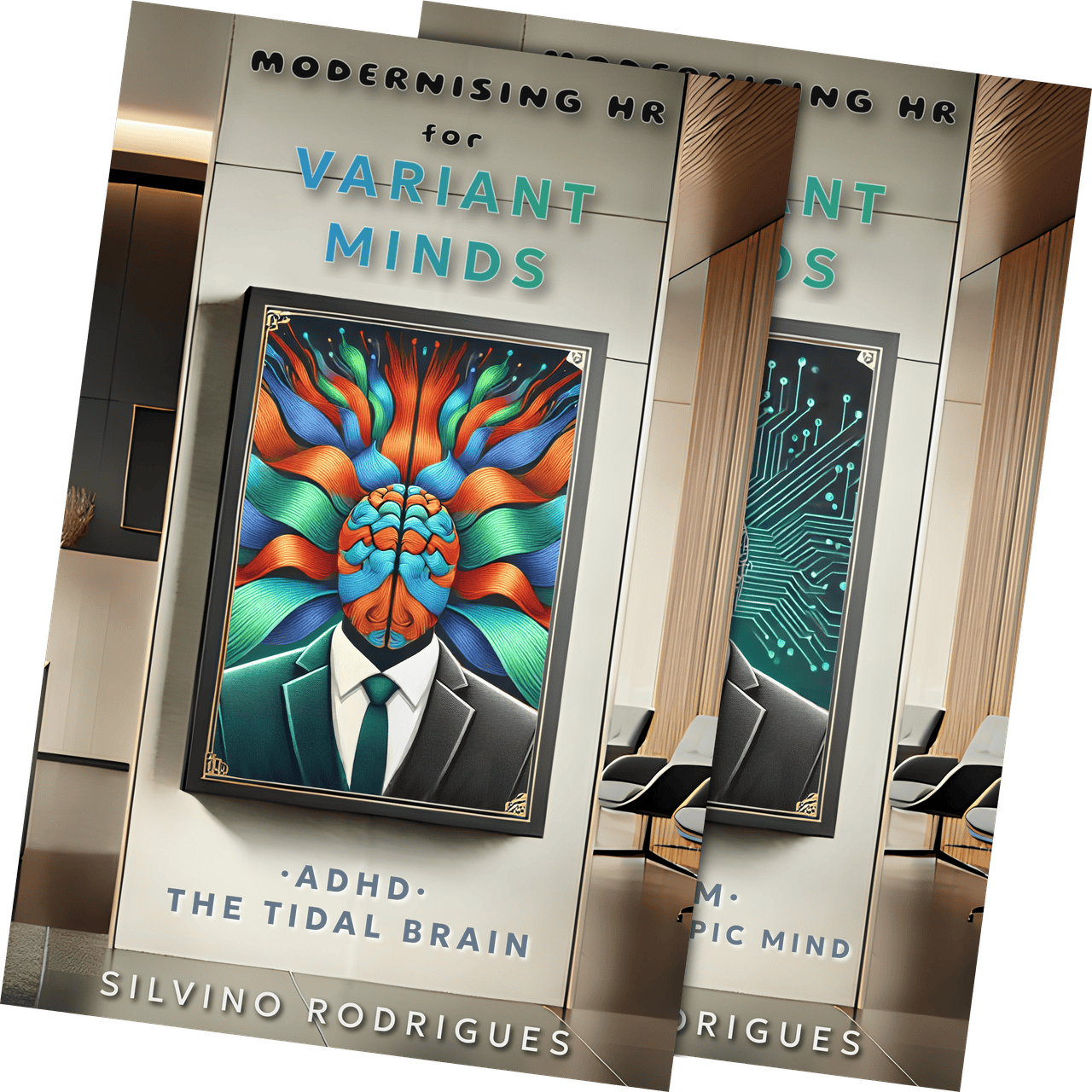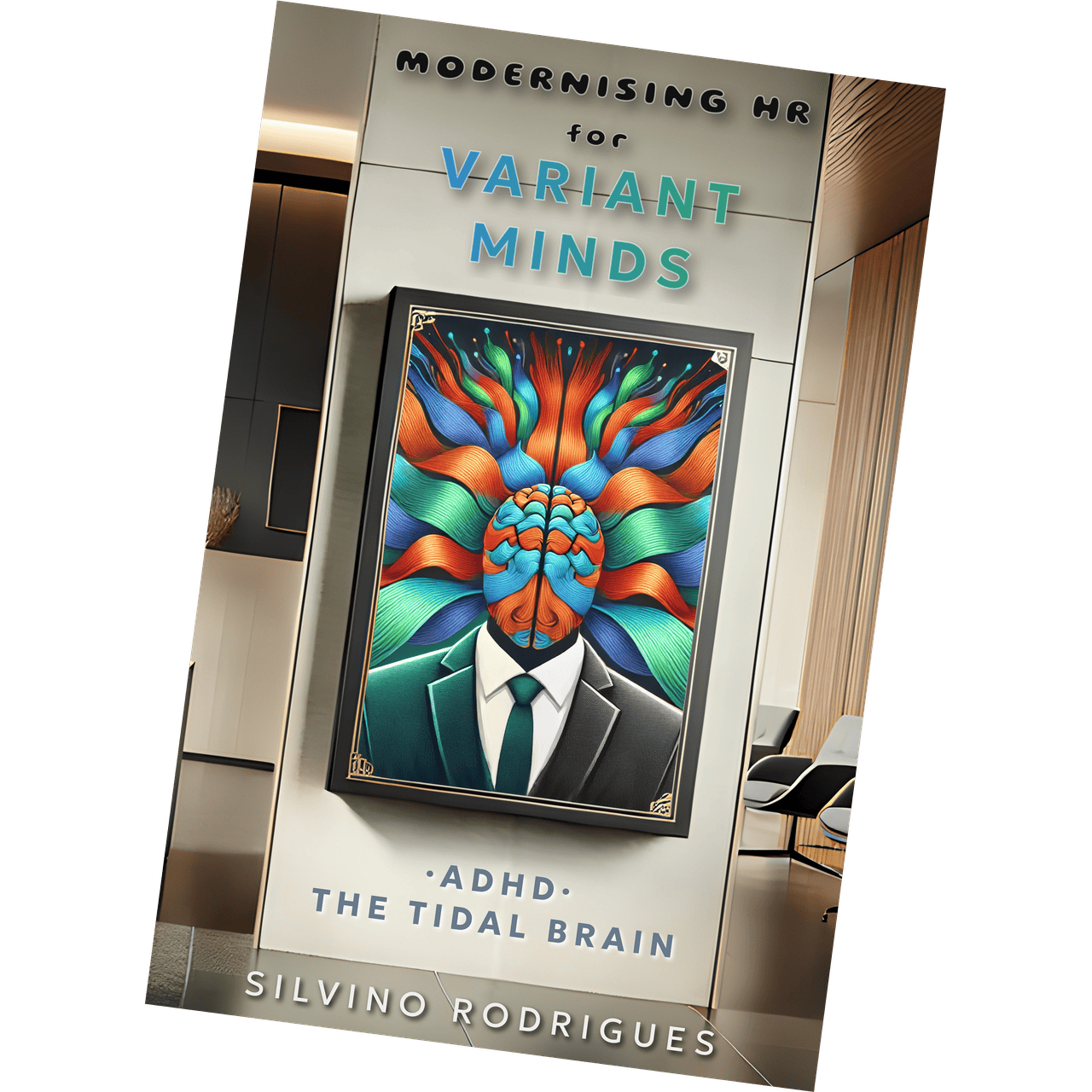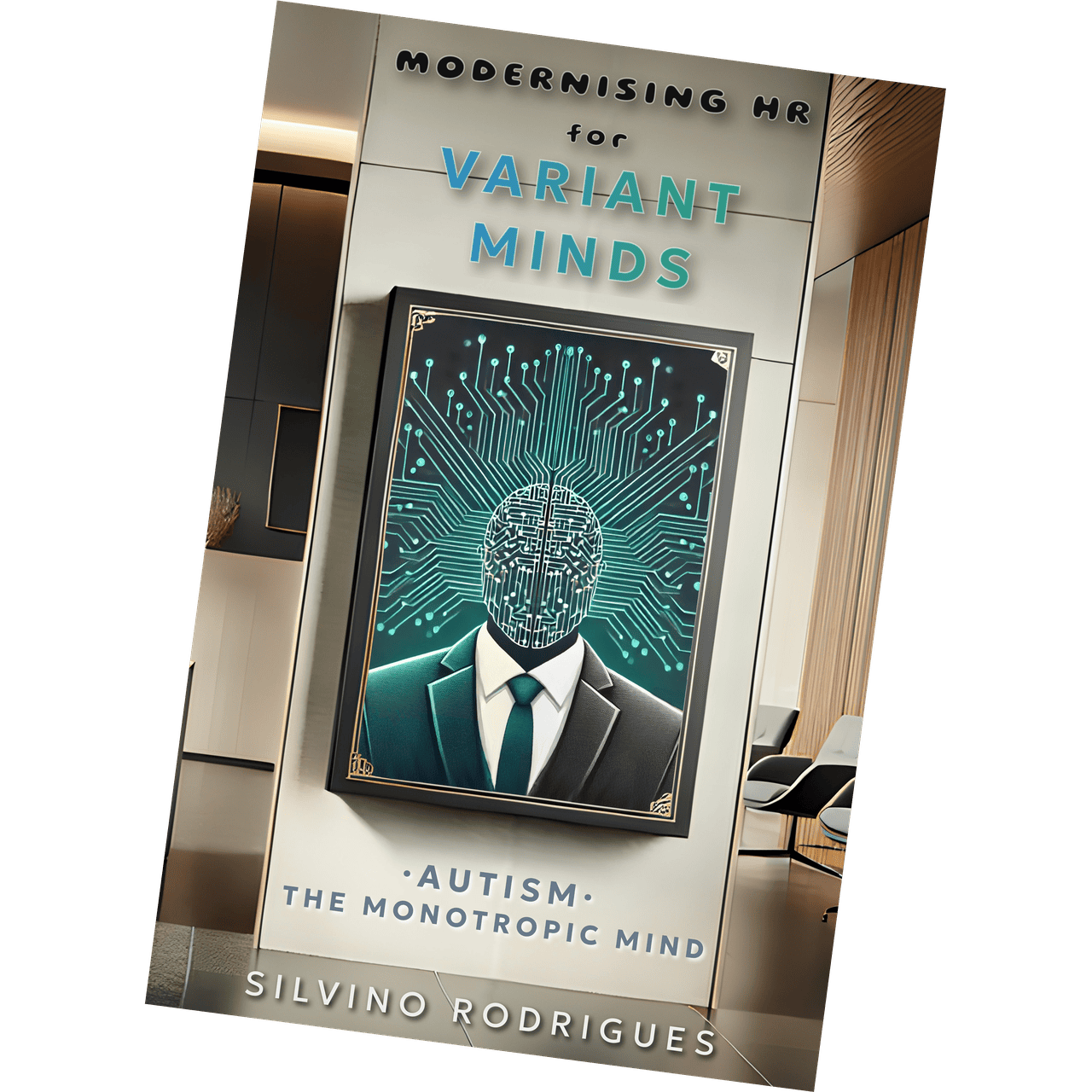About the Book Set
Modernising HR for Variant Minds is a two-book series designed to help HR professionals, managers, and executives move beyond outdated practices and build workplaces where neurodivergent employees can thrive.
Each volume tackles a distinct condition and its workplace implications:
ADHD - The Tidal Brain explores the fast-moving, idea-rich, but often misunderstood world of ADHD in the workplace. It unpacks how traits like hyperfocus, time-blindness, and rejection sensitivity play out on the job, and offers practical frameworks to turn volatility into creativity, and attrition risk into retention.
Autism – The Monotropic Mind examines ASD, reframing monotropism as a source of deep focus, precision, and innovation. It challenges HR reliance on “cultural fit,” biased reference checks, and personality testing, while offering strategies to build sensory-aware workplaces, inclusive policies, and manager toolkits that respect identity-first language and late diagnosis.
Together, these books form a concise, actionable guide to modernising HR for the future of work. They equip decision-makers to recognise neurodivergent strengths, design fairer systems, and create environments where difference is not just accommodated, but valued as a driver of innovation, resilience, and growth.
About Book 1: ADHD - The Tidal Brain
Understanding and supporting ADHD employees is no longer optional - it's a business imperative. Modernising HR for Variant Minds: ADHD - The Tidal Brain is a practical and accessible guide for HR leaders, managers, and executives who want to move beyond outdated policies and build workplaces that truly harness neurodivergent talent.
Drawing on the latest research and real-world corporate experience, this book reveals why conventional hiring, performance management, and cultural “fit” models often exclude ADHD employees, and what to do instead. From rethinking recruitment filters to redesigning performance reviews, it offers actionable strategies that improve retention, reduce attrition costs, and unlock innovation.
Inside you'll find:
- A clear explanation of how ADHD traits influence workplace behaviour, from hyperfocus and rapid idea generation to rejection sensitivity and time-blindness.
- Concrete accommodation strategies, including body doubling, structured feedback systems, sensory-aware workspace design, and flexible workflows.
- Guidance for managers on balancing empathy with accountability, turning ADHD traits into assets rather than liabilities.
- Practical frameworks that shift training, onboarding, and review processes from gatekeeping to scaffolding - helping employees and organisations thrive together.
Written in a concise, conversational style, Modernising HR for Variant Minds distils the essential lessons from the larger Employing Variant Minds series into a pocket guide for decision-makers. It equips leaders to recognise and support ADHD employees, implement fair and effective workplace adjustments, and challenge unconscious biases that silently drain productivity.
Whether you are an HR professional, a team leader, or a senior executive, this book will help you build a modern workplace where neurodivergent minds are not just included, but valued as drivers of creativity, resilience, and growth.
About Book 2: Autism - The Monotropic Mind
Autism in the workplace is often misunderstood - not because autistic people lack ability, but because HR systems are built around neurotypical assumptions. Modernising HR for Variant Minds: Autism - The Monotropic Mind challenges that mismatch.
Where ADHD is tidal, pulling attention in and out, autism is monotropic: energy flows into deep focus, precise thinking, and sustained commitment. Those same qualities can fuel innovation, quality, and resilience - but only if workplaces stop forcing autistic staff into “cultural fit” moulds that ignore difference.
This book equips HR professionals and leaders with practical tools to move beyond outdated practices. It explores how to:
- Design recruitment processes that don't exclude direct communicators or late-diagnosed applicants.
- Replace biased reference checks and personality tests with fairer measures of ability.
- Create sensory-aware workplaces that support concentration without alienating teams.
- Build policies that respect identity-first language, late diagnosis, and the realities of comorbid conditions that often accompany ASD.
Written in a direct, conversational style, it's a field guide for managers who want to turn inclusion from a slogan into a system. The message is simple: when you embrace the monotropic mind, you don't just support autistic employees - you future-proof your organisation.
About the Author

Silvino Rodrigues brings a rare combination of lived experience and formal expertise to the neurodivergence conversation. With over thirty years of corporate technology and tertiary studies spanning electronics engineering, software development, financial management, an MBA, and postgraduate work in adult education and psychology, Silvino writes with both analytical rigour and hard-earned personal insight.
A late-life discovery of autism and ADHD sparked a new direction: understanding why so many neurodivergent adults - and those who live and work alongside them - struggle to bridge a gap neither side can fully see. These books provide partners, colleagues, and employers seeking genuine understanding with clear explanations of how variant minds work.
Silvino now dedicates time to neurodivergent research, writing, and advocacy and is available for corporate and public speaking engagements on neurodivergence in relationships, workplaces, and everyday life.
News and Updates
Book 1: ADHD - The Tidal Brain
- Released 18th August 2025.
- Available on Apple Books.
.. in English: EN - Available as Kindle eBook1.
.. in 13 geographies (English content):
AU CA UK US
& BR DE ES FR IN IT JP NL MX - Print (6x9" Paperback) available on special, bulk order - Contact Us
- Number of pages (print): 318
- ISBNs:
- Print:
978-1-7638955-2-2 - eBook:
978-1-7638955-3-9
Book 2: Autism - The Monotropic Mind
- Released 1st November 2025.
- Available on Apple Books.
.. in English: EN - Available as Kindle eBook1.
.. in 13 geographies (English content):
AU CA UK US
& BR DE ES FR IN IT JP NL MX - Print (6x9" Paperback) available on special, bulk order - Contact Us
- Number of pages (print): 308
- ISBNs:
- Print:
978-1-7638955-4-6 - eBook:
978-1-7638955-5-3


